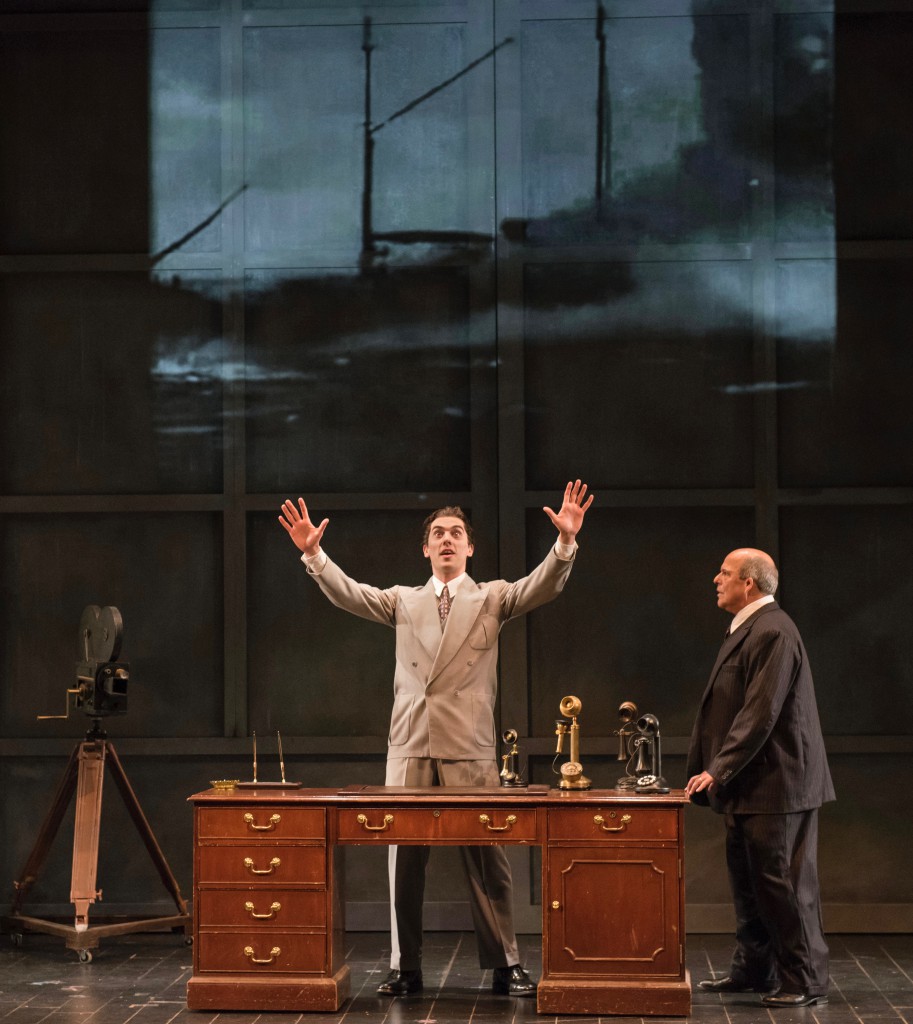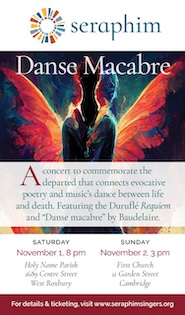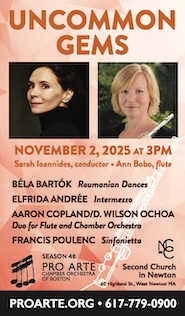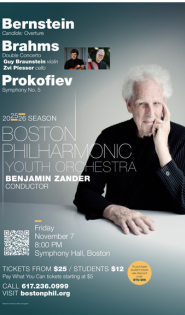Musical worlds collide with BLO’s world premiere of “Schoenberg in Hollywood”

Jesse Darden as Irving Thalberg and Omar Ebrahim as Arnold Schoenberg in the world premiere of Tod Machover’s “Schoenberg in Hollywood” at Boston Lyric Opera. Photo: Liza Voll
In 1935, only a few months after he had settled in California, Arnold Schoenberg met with famous MGM producer Irving Thalberg about the possibility of writing music for films. But what looked to be the beginnings of a fruitful relationship quickly fizzled when Schoenberg, after scoring parts of The Good Earth, demanded total control of the soundtrack.
That meeting is the point around which Tod Machover’s latest opera, Schoenberg in Hollywood, turns. Presented in its world premiere by the Boston Lyric Opera at the Emerson Paramount Center Wednesday night, this enticing historical drama explores the conflict between maintaining artistic integrity and an artist’s longing to reach a wider audience in order to shape a better world.
Crisp, occasionally funny, and delightfully odd, Schoenberg in Hollywood examines these problems through some of the most arresting music heard in a BLO premiere in recent seasons.
Despite its title, Schoenberg in Hollywood tells of the composer’s life before he drove a Rolls Royce, played tennis with George Gershwin, and attended garden parties with Harpo Marx in the Los Angeles suburbs. Part biopic and part psychological study, Simon Robson’s libretto portrays a solitary figure who lives constantly in his head. Schoenberg, driven by talent and ego, longs to transform the world through music. Yet he is also afraid of moving forward.
Situations from Schoenberg’s life—his modest upbringing in Vienna, his troubled marriage to Mathilde Zemlinsky, and the rise of anti-Semitism in Austria following German defeat in World War 1—are played out as scenes from classic Hollywood genres. Schoenberg by turns assumes the roles of Humphrey Bogart, Groucho Marx, and even Superman as he battles betrayal, discrimination, and failure, all the while maintaining the idea that art should rise above the clutter of everyday life. The composer’s religious faith—his conversion to Lutheranism and then back to Judaism—is also a running theme.
Omar Ebrahim, making his BLO debut, portrays Schoenberg. His broad, oaky baritone cast the composer as a deeply wise and at times avuncular presence. Delivering some of his lines halfway between speech and song, Ebrahim effectively captured the awkwardness of a man torn by feelings of superiority and artistic loneliness. Singing about the bad reviews he has received, Ebrahim’s Schoenberg laughed off the pain of rejection to wild, jazzy melodies.
And music, in Ebrahim’s portrayal, was constantly on the composer’s mind even in the most unusual situations. Playing Humphrey Bogart complete with clumsy impression, Schoenberg, upon discovering that Mathilde is having an affair with the artist Richard Gerstl, belted out the line, “at least I treat all tones equally,” before forgiving both of them.
Tenor Jesse Darden and soprano Sara Womble depicted a number of characters in Schoenberg’s life. As his parents, they were stalwart, and Womble even pushed a grand piano around the stage to force the symbolism of the family’s financial struggles and their son’s gift. As Mathilde, Womble’s light but ringing soprano took on a poignant anguish as the character struggled with her husband’s focused but impractical artistic vision. (In the opera, Schoenberg turned down a commission for Pierrot lunaire because he felt he could not compose for money).
Darden’s warm, buttery tenor aptly suited the roles of both Alban Berg and Anton Webern, who lavished praise upon their teacher as the public seemed to show nothing but scorn for his music.
Schoenberg’s own strange, chromatic strains are frequently the focus of Machover’s dark and brilliant score. Quoting passages from Verklärte Nacht, the String Quartet No. 2, and Moses und Aron, Machover weaves a dense musical tapestry before tearing through it with dissonances of his own. Written for chamber orchestra and electronics, Machover’s music employs brash cluster chords and spare octaves to highlight the immediacy and intensity of Schoenberg’s resolve.
Elsewhere, the music draws upon well-worn clichés in surprisingly witty ways. When Schoenberg and his second wife Gertrud settle in California, Machover set their journey as a Western complete with brief quotations of “Happy Trails to You.” The “Schoenberg Scandals,” depicting the composer’s bad reviews, had the composer singing “I’m Killin’ Tonality” to “Singing in the Rain” just long enough to milk a few laughs. The concluding scene was mystifying. Through music of Glassian repetition and harmonies of dizzying weirdness, Schoenberg, after his fallout with Thalberg, looks to the future by characteristically turning inward, resolutely blazing forward with his revolutionary musical theories.
Set up behind the scenery onstage, the orchestra, led by David Angus, played Machover’s score with precision and zeal. The electronics provided eerie washes of sound that seemed to probe the depths of Schoenberg’s mind as he was lost, Nixon-like, in his own past.
Karole Armitage’s stage direction kept the scenes moving swiftly in the opera’s ninety-minute, intermission-less stretch. At one point Nancy Leary’s modest costumes refashioned Schoenberg and the other characters as the Marx Brothers, who relayed tongue-in-cheek the troubling Austrian anti-Semitism of the time, and at another cowboys in search of life in the American West. Director’s chair, movie camera, and grand piano were just enough to convey simple office and studio scenes. Schoenberg’s contemplative life, after all, is best told through the theater of the mind.
Schoenberg in Hollywood runs through Sunday at the Emerson Paramount Center. blo.org
Posted in Performances






Posted Nov 16, 2018 at 1:29 pm by Jo Frances Meyer
Great review Aaron! I loved the show, thought it was brilliantly conceived and performed, and enjoyed reliving it as I read your piece.
Hope you’re well and wishing you a lovely Thanksgiving!
All best,
Jo Frances